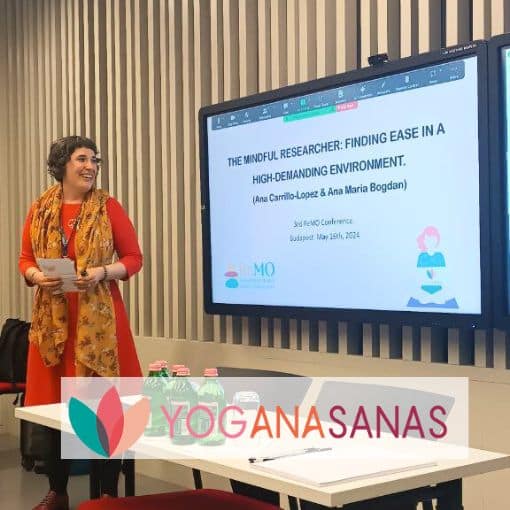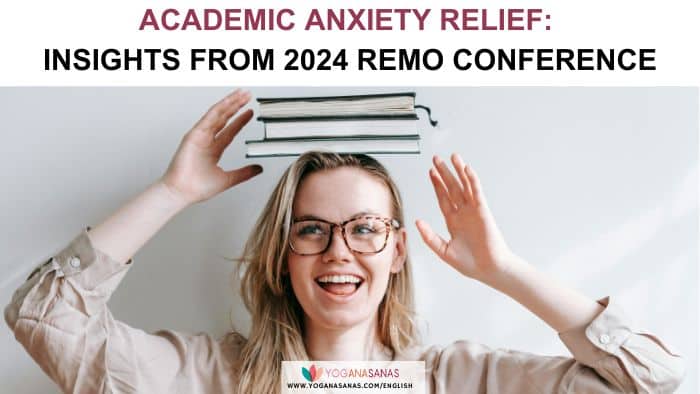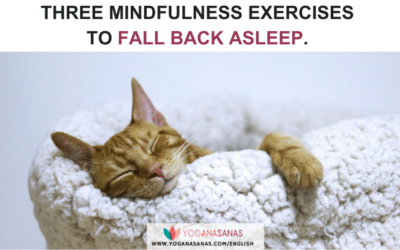Table of Contents
Academic Anxiety Relief: Insights from the ReMO Conference 2024.
Last month I offered a workshop for anxiety-relief at the 3rd Conference of the Researcher Mental Health Observatory (ReMO) in Budapest. For the past few years, ReMO has been actively building an international network that shines light on the well-being of academics and researchers.
As a former academic who lacked mental health support as a PhD candidate and researcher, I was extremely surprised when I learned about ReMO.
My highlights of the 3rd ReMO Conference in Budapest 2024.
Compared to others academic conferences, this one really struck me as conference in which its openness and vulnerability fostered people’s connection and closeness.
On the first day, Luisa Solms opened the conference with her workshop on ‘Breaking the silence around well-being at work.’
Even though it had been 7 years since I actively stepped out of academia, Luisa’s workshop really brought me back to my time as a PhD candidate and a teacher at the university. It was deeply moving to be able to talk about the extreme inner and outer pressures, on top of the lack of support, that academics and researchers go on a daily basis.
I also enjoyed participating in the Theatre Action Project lead by Petra Ardai, Simone Lackner and Sarah Ng. I also found enlightening to learn about the state of the STAIRCASE Survey through Stefan Mol – a survey that allows researchers sharing their academic working conditions in relation to mental health.
Lastly, I was highly impressed by the work that Friny Panayidou and Benjamin Priest are doing with their support groups. For 8 weeks, PhD candidates have a space where they can share their struggles in a safe and non-judgmental way. I really wish this had been an option at Leicester University while I did my PhD back in 2013. I can imagine that these support groups fulfil many needs such as connection, to be seen, to be heard, consideration, acknowledgment and trust.
Oh! I also enjoyed the company of many other people who didn’t present (or I couldn’t attend their presentation) yet were present. I’m particularly thinking of Andrea, Kati, Helen, Brian, Gabor, Mathias or Richard. It was so valuable and meaningful to connect with them as well.
Mindfulness and self-empathy for anxiety-relief in academics.
Having attended many academic conferences in the past, I was determined to spark curiosity and bring joy to whoever would join my presentation. If you’re curious about your body – even when you’re really stressed – your mind opens up to a different attitude towards yourself. From self-judgment, running away or ignoring whatever is going on with you to wondering with a child-like fascination. It’s that simple.
Not easy, I know, but it is simple.
So, for the first practice of my workshop, I invited my good old friend Louis Armstrong. OK, he’s not my friend, but you know what I mean. During the first 10 minutes of the workshop, I guided a mindfulness practice using the well-known song ‘Hello, Dolly!’ of Mr. Armstrong as an anchor.
First, I asked participants to find a moment that caused some anxiety at work. Once they connected with their thoughts and emotions around that experience, I invited them to connect with their body. Then, I asked participants to bring their attention back to their physical sensations with the help of this phrase: ‘Hello, Dolly! How is your body feeling right now?’ The idea was to use this phrase as a way to come back to practising embodied awareness. A reminder, an invitation to practice curiosity even when we’re not feeling great. If you got distracted, you would mentally say: ‘Hello, Dolly!’ And return to your body.
If you’re curious about this practice, you can listen to it following this link.

For the second half of my workshop, we practiced with another stressful or uncomfortable moment at work. Making use of the list of the universal human needs of the nonviolent communication (NVC) framework, I asked participants to let go of the story they were telling themselves. Instead of feeding the thoughts they had around this unpleasant experience, I invited them to think of the 3 needs they wished had been met at that moment.
Regardless of whether we believe the situation was right or wrong, we deserved that situation or not… according to NVC our needs are always at the forefront of these stressful situations, particularly when we’re triggered. When something really bothers us, it means that some of our most valuable and precious needs are not being met.
Let me illustrate this with one of my examples. Imagine that for this practice I use a conversation with my PhD supervisor. Once during a supervision meeting, I told them:
– In June I will take a week off.
– Oh, at least one of us is taking a holiday this year. – was their reply.
I’m not making this conversation up; this actually happen to me.
I remember that at that moment I felt ashamed, guilty, upset, confused and frustrated.
That comment was so painful that my mind immediately raced into all sorts of thoughts:
“Couldn’t they be happy for me?” “Shouldn’t I take some holidays?” “Have I done anything wrong?” “Don’t I deserve some time to rest?” “This is unacceptable…”
Anyway… I’m sure you get the point. Lots of questions, judgments… all the thoughts that you go through when something stressful happens to you.
I imagine that the nature of the participants’ thoughts was very similar to mine at that moment. Judgments, analysis, trying to understand the other’s behaviour, criticising our own.
After a few minutes of silence and self-reflection, I asked them about their needs.
What were they longing for at that moment of distress?
What needs were not being met for them?
Coming back to the example of the conversation with my former PhD supervisor, at that moment, I was definitively longing for support, to be seen, recognition, balance, respect and trust. All of those needs were shaken when my supervisor answered: “at least one of us is taking a holiday this year.”
What needs did attendees share when I asked them about theirs? Trust, to be seen, consideration, respect, freedom, space, integrity, collaboration and stability.
I was so touched by hearing their needs. While I was listening to their needs, I felt this sense of commonness and closeness.
Trust… yeah, I know how it is to long for trust at the university.
To be seen, of course! It is so powerful to feel that from someone you work with.
Consideration, indeed! When I know others take me into consideration, I am much more likely to work at ease, to feel connected and willing to cooperate.
All these universal needs reminded that even when it hurts not to have them all fulfilled, we’re constantly doing our best. And sometimes our best really sucks or other peoples’ best also sucks. And yet… both head of departments and first-year PhD candidates care for their needs being met.
Although I wish there had been more time to explore these needs, I got the impression that people really enjoyed this exercise. It’s a practice that brings the focus back to what matters most in our human experience. Allowing us to let go of all judgments, interpretations, fears and frustration aside, we shine light on our human needs.
How do mindfulness and self-empathy help in reducing anxiety and stress, particularly in an academic setting?
The workshop that I offered was a teaser of the two articles that I will be publishing (one of them in collaboration with Dr. Ana Maria Bogdan) later this year with the support of the ReMO network and EU funding. These articles will provide a mindfulness, compassion and self-empathy toolkit (from a nonviolent communication perspective) for academics and researchers, so they can combat stress and anxiety at work.
To tell you the truth, the part of me that used to be in academia wishes that I could have read these articles when I worked at the university.
Sadly, my time there was full of anxiety and stress, day after day. Year after year.
Was this presentation good enough?
Will I get the grade I want?
Will my supervisor guide me?
How will I find the data I need?
Will I fit in in the new department?
Where will I get my next grant?
How will I learn and teach this new subject for next week?
Nothing wrong with experiencing stress and anxiety every now and then but if they become chronic, they can really damage your health. To the point, like it happened to me that, you get burnout and can’t cope with it anymore.
I really hope that I can keep contributing to academics. If you’re curious, one of my dreams is to be able to create an international network of empathy support groups for academics and researchers.
If you made it until this point, I’d love to know your experience as an academic or researcher.
How has your mental health been shaped in academia?
Did you receive the support you needed?
Let me now down below the comments!
Blog post image by George Milton.







0 comentarios